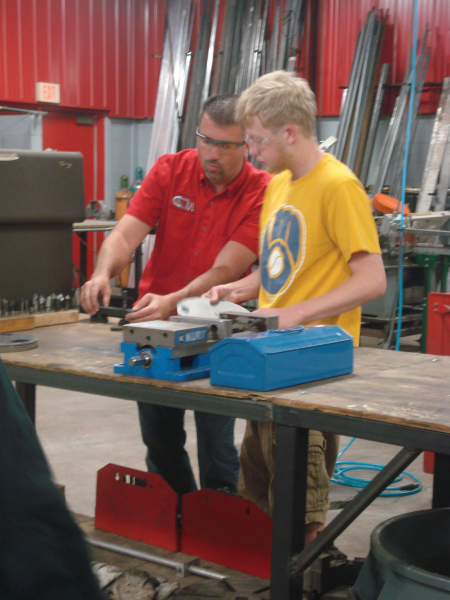
With unemployment at 5.5% and baby boomers starting to retire it is vital for manufacturing to tap into the high schools and colleges for fresh talent. I believe making things and getting paid to do it is starting to resonate with young people in some communities. In Northern Wisconsin it is definitely catching on. -Lloyd Graff
At first glance it might seem odd that a business run and operated by high school students recently reeled in the Iron County 2014 Business of The Year award, but take a closer look and it becomes clear that Northwoods Manufacturing isn’t your average school program.
Based out of Hurley High School in the northern tip of Wisconsin, Northwoods Manufacturing has quickly evolved into a money-making venture that teaches advanced machining on metal and wood, develops professionalism, and increases students’ awareness of the manufacturing careers available to them following graduation.
Along the way, it gives students real-world manufacturing experience within a traditional school setting. Students can progress through the technology education program, create a resume and cover letter, and then interview for a job.
Once accepted into the student-run business, they are given positions ranging from welders and machinists to engineers and marketers, and related labor is performed using work orders and timecards in order to handle projects for local companies.
The jumpstart that made this unique setup possible came in the form of financial support from the Hurley Board of Education, the Hurley Education Foundation, local industry, and other community supporters, which produced over $80,000 in initial funds.
In addition to donated equipment, this pool of money led to the purchase of three new Miller 252 MIG welders, three Miller Sycrowave 210 Tig Welders, three Miller Thunderbolt Stick welders, a Clausing Lathe, Shopbot wood CNC, Sharp 3-axis metal CNC, and other tools.
“It’s really exciting to be in it from the ground floor and to see the enthusiasm from the kids,” says Mark Manzanares, tool room manager at Ironwood Plastics, who notes just how quickly the program has taken off. “When we first started to work with the school we had a three year plan,” he says. “I think in the first year we exceeded that three-year plan and we’re just continuing to grow with them.”
And thanks to field trips that have included tours of area companies and events like career day, which pairs students with local professionals, students are seeing local industry up-close and interacting with those who are currently working in fields they might just choose to enter.
“It’s amazing how much pride they have in their shop,” Manzanares adds. “The program not only teaches them about industry but also teaches them about the soft skills as well. You need to clean up your work area, you need to show up on time, you have deadlines to meet, and it’s really exciting to see them buy into that.”
The dynamic that has evolved is a win-win, notes Jacob Hostettler, metals instructor at Hurley High School. “By helping us, they’re helping themselves fill the jobs that they have in this area,” he says. “It works out for the schools, the students, and eventually down the line it will help the industry that is helping the schools.”
The success noticed early on in Hurley can be attributed at least in part to Hostetler’s student teaching experience at Eleva-Strum Central High School in the western portion of the state, which has an established student-run machine shop business called Cardinal Manufacturing.
“Once you bring relevance to the classroom all of a sudden the kids want to learn and it’s more exciting – it’s not just a project to get done, get a grade, and throw away,” says instructor Craig Cegielski, who initiated the program back in 2007. “Now there’s some real deadlines, some real quality issues, real customers and real money.”
Cegielski estimates that Cardinal Manufacturing will bring in roughly $150,000 this year, allowing the program to remain self-sufficient. This aspect may be heartening to other local schools who would like to run a similar program but simply cannot afford it. “We’re kind of solving that financial problem at a high school level and by doing this we’re producing more trained students that are choosing technical careers,” he adds.
With an estimated 10 to 20 percent of its graduating class heading on to manufacturing careers, Eleva-Strum Central High School is helping create a pipeline of well-trained, well-prepared students who are ready to head into the field or onto further education.
And it’s easy to see how a greater number of schools doing similar things could help tackle a larger issue. “Right now in the state of Wisconsin and the United States there is a big demand for the skilled trades,” he explains. “There’s all this talk about a skills gap. Nobody can find enough machinists, welders, or fabricators.”
Cegielski is eager to share what he’s learned along the way in order to address this skills gap. The creation of a detailed guide will soon be posted on Cardinal Manufacturing’s website, for example, thanks to a grant from the Wisconsin Economic Development Corporation (WEDC). The document will outline steps his program has taken in the hopes of making it easier for other interested school districts to hit the ground running.
Even though the model developed at Eleva-Strum Central High School is becoming increasingly sought after, Cegielski says there’s a realization that the program can continue to evolve, grow and improve moving forward. “We’re certainly happy where we’re at,” he says, “but we have lots of ideas on how this place can be so much better five years from now.”
Question: Would you want your kids to make manufacturing their career?


5 Comments
Yes, but as a professional. I have one son that has a degree in Chemistry, working for a fitting company. My youngest is in college now for Engineering, he works summers for the same fitting company. I believe the education gives them options for all types of work in manufacturing.
If I had kids, sure. Agree with Doug on the education part.
Have a Nephew that is an engineer, when he graduated college companies were competing for him. He is doing very well now.
Wish we had something like that in school, would beat working at the car wash.
Being a Baby Boomer I wanted my kids to do better than me, go to college, work in an office, make lots of money. I helped my son go to college, he got a degree in Graphic Arts. Two years later he was bored, not making much money. He took a job with Alcoa pouring molten aluminum, and loved it. Started learning the alchemy side of it and started mixing alloy to make the grade for that pour.
He got laid off a short time later, I got him a job working with me in a gear shop here in Chicago. Started out running lathes, mills and hobbing machines in a cell and did well with very good training from his boss. I ran the gear tooth grinding department, and he was fascinated by the process. He bid into the department a year later, excelled at learning gearing and the grinding of, and became a lead man a few years later.
I had moved on to the engineering side of the business, and the new grinding boss was leaving, so my son interviewed for the job, and was awarded the position.
This is a long winded story, and I apologize, but felt it needed to include his progression. Watching my son progress, I have thought for a long time that we parents were to blame for the decline of manufacturing here in the States, we wanted our children “to do better than us”. Our elected leaders make a big deal out of sending our children to college. Well not everyone is meant to go to college, some, like me and the rest of you that have made a career in machining like to make things with our hands, to be able to use our minds to solve the problem of machining a complicated part. My son has that same desire.
I encourage young people to get into manufacturing, a very fulfilling career.
That’s a good story.
Your son has a good Father and Mentor.
Good story, Bob. We parents (and society) are the culprits. Usually for descent reasons, we try to direct our kids into careers we think would be right for them instead of helping them to make good decisions for themselves. We usually think we know better than they do what’s good for them and that can often be terribly wrong.